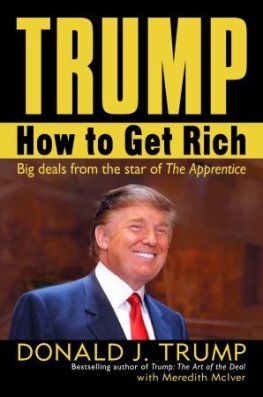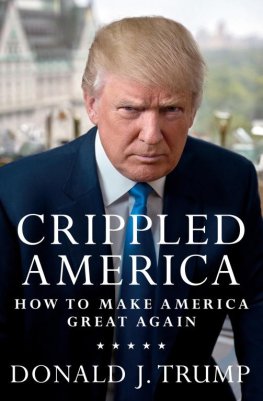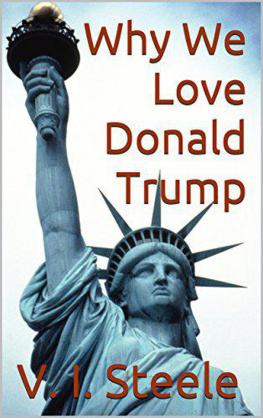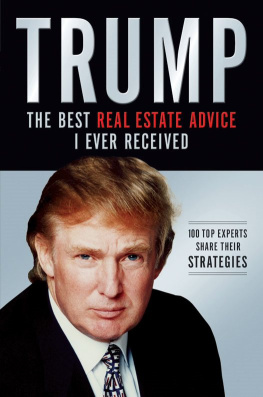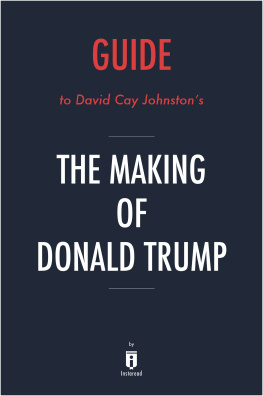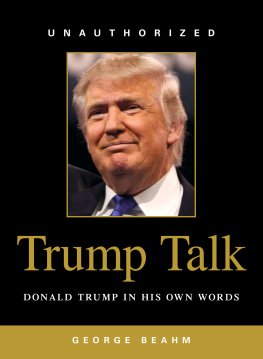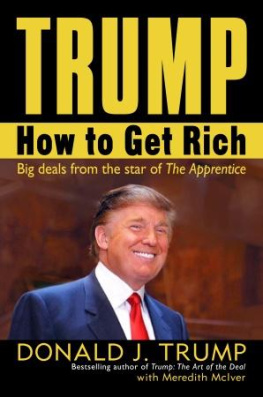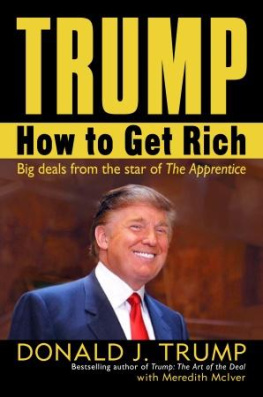Donald J. Trump
HOW TO GET RICH
Five Billion Reasons Why You Should Read This Book
A lot has happened to us all since 1987. Thats the year The Art of the Deal was published and became the bestselling business book of the decade, with over three million copies in print.
Business Rule #1: If you dont tell people about your success, they probably wont know about it.
A few months ago, I picked up The Art of the Deal, skimmed a bit, and then read the first and last paragraphs. I realized that after seventeen years they still rang true. I could have written these words yesterday:
First paragraph: I dont do it for the money. Ive got enough, much more than Ill ever need. I do it to do it. Deals are my art form. Other people paint beautifully on canvas or write wonderful poetry. I like making deals, preferably big deals. Thats how I get my kicks.
Last paragraph: Dont get me wrong. I also plan to keep making deals, big deals, and right around the clock.
Its now 2004, Im still making deals around the clock, and I still dont do it for the money.
I dont think you should do it for the money, either. Money is not an end in itself, but its sometimes the most effective way to help us realize our dreams. So if youve got big dreams and youre looking for a way to make them happen, this book is for you.
How to Get Rich.Thats what I decided to call it, because whenever I meet people, thats usually what they want to know from me. You ask a baker how he makes bread. You ask a billionaire how he makes money.
Sure, there have been countless how-to-get-rich books written by millionaires. Billionaire authors are harder to find. Billionaire authors with interests in real estate, gaming, sports, and entertainment are rarer still.
And billionaire authors with their own Manhattan skyscrapers and hit prime-time TV series are the rarest of all. Im pretty sure Im the only one, though Oprah could give me a run for the money if she ever decides to write another book and get into real estate.
Business Rule #2: Keep it short, fast, and direct. The following pages will be straightforward and succinct, but dont let the brevity of these passages prevent you from savoring the profundity of the advice you are about to receive. These stories and words of wisdom have been distilled from almost thirty years at the top.
So here it comes: The Scoop from The Donald. After you make your first billion, dont forget to send me a thank-you note. You know the address.
Business Rule #3: Begin working at a young age. I did.
In The Art of the Deal, I mentioned my nemesis and mentor at New York Military Academy, Theodore Dobias, here on my left. Major General John Brugmannis on my right.
I am the chairman and president of The Trump Organization. I like saying that because it means a great deal to me. There are almost twenty thousand members of this organization at this point. I did a print ad once in which I declared, I only work with the best. That statement still stands.
More and more, I see that running a business is like being a general. Calling the shots carries a great deal of responsibility, not only for yourself, but for your troops. Your employees lives, to a large extent, are dependent on you and your decisions. Bad strategy can end up affecting a lot of people. This is where being a leader takes on a new dimension. Every decision you make is an important one, whether there are twenty thousand people working for you or just one.
If you are careful when finding employees, management becomes a lot easier. I rely on a few key people to keep me informed. They know I trust them, and they do their best to keep that trust intact.
For example, when I need to know something about my casinos and hotels in Atlantic City, I know I can call up Mark Brown, my CEO, and get a fast and informed answer. If I call Laura Cordovano over at Trump Park Avenue and ask about sales, shell give it to me exactly as it is. If I call Allen Weisselberg, my CFO, hell tell me what I need to know in twenty words or less. My senior counsel and Apprentice adviser, George Ross, can do it in ten words or less. Find people who suit your business style and youll have fewer problems to deal with as time goes on.
Good people equals good management and good management equals good people. They have to work together or they wont work together for very long. Ive seen good management get by with mediocre people, and Ive also seen excellent people get stuck in the mires of bad management. The good managers will eventually leave, followed by the good workers, and you will be left with a team that gets along because theyre all mediocre. Save yourself time by getting the best people you can. Sometimes this can mean choosing attitude over experience and credentials. Use your creativity to come up with a good mix.
Creative people rarely need to be motivatedthey have their own inner drive that refuses to be bored. They refuse to be complacent. They live on the edge, which is precisely what is needed to be successful and remain successful.
One of my former employees was in charge of a new project. He had done a thorough and acceptable job, but I felt that something was missing. It wasnt fantastic, which, knowing his capabilities, it should have been. I decided to challenge his creative ego by mentioning that it was fine but seemed to lack inspiration. I politely asked him whether he was genuinely interested in the project and suggested that perhaps that might be the problem.
Well, the guy went ballistic on me. He was deeply insulted.
And, as you can probably guess, the revision he turned in was terrific. The difference between the first draft and the final version was incredible. I didnt slam the guy because he was usually demanding of himself and had never let me down. But I had to give him a jolt.
Generals motivate their soldiers; they inspire them when it is necessary. They do the same for their highest-ranking officers. We all need a boost now and then. Learn how to tailor your method to the personalities you are managing.
Keep the big picture in mind while attending to the daily details. This can seem like a balancing act, but it is absolutely necessary for success in running a company.
In the 1980s, I was riding high. After learning the essentials of real estate development from my father, Fred, a builder in Queens and Brooklyn, Id become a major player in Manhattan, developing Trump Tower, the Grand Hyatt Hotel, and many other top-tier properties. I had a yacht, a plane, a bestselling book.
One magazine headline said, EVERYTHING HE TOUCHES TURNS TO GOLD, and I believed it. Id never known adversity. I went straight from Wharton to wealth. Even in down markets, I bought properties inexpensively and made a lot of money. I began to think it was easy.
In the late eighties, I lost focus. Id fly off to Europe to attend fashion shows, and I wasnt looking at the clothing. My lack of attention was killing my business.
Then, the real estate market crashed. I owed billions upon billions of dollars$9.2 billion, to be exact. Thats nine billion, two hundred million dollars. Ive told this story many times before, but it bears repeating: In the midst of the crash, I passed a beggar on the street and realized he was worth $9.2 billion more than I was. I saw a lot of my friends go bankrupt, never to be heard from again.
The media had me for lunch. Forbes, Business Week, Fortune, The Wall Street Journal, The New York Timesthey all published major stories about my crisis, and a lot of people seemed to be happy about it.
Ill never forget the worst moment. It was 3 A.M. Citibank phoned me at my home in Trump Tower. They wanted me to come over to their office immediately to negotiate new terms with some foreign banksthree of the ninety-nine banks to whom I owed billions.

